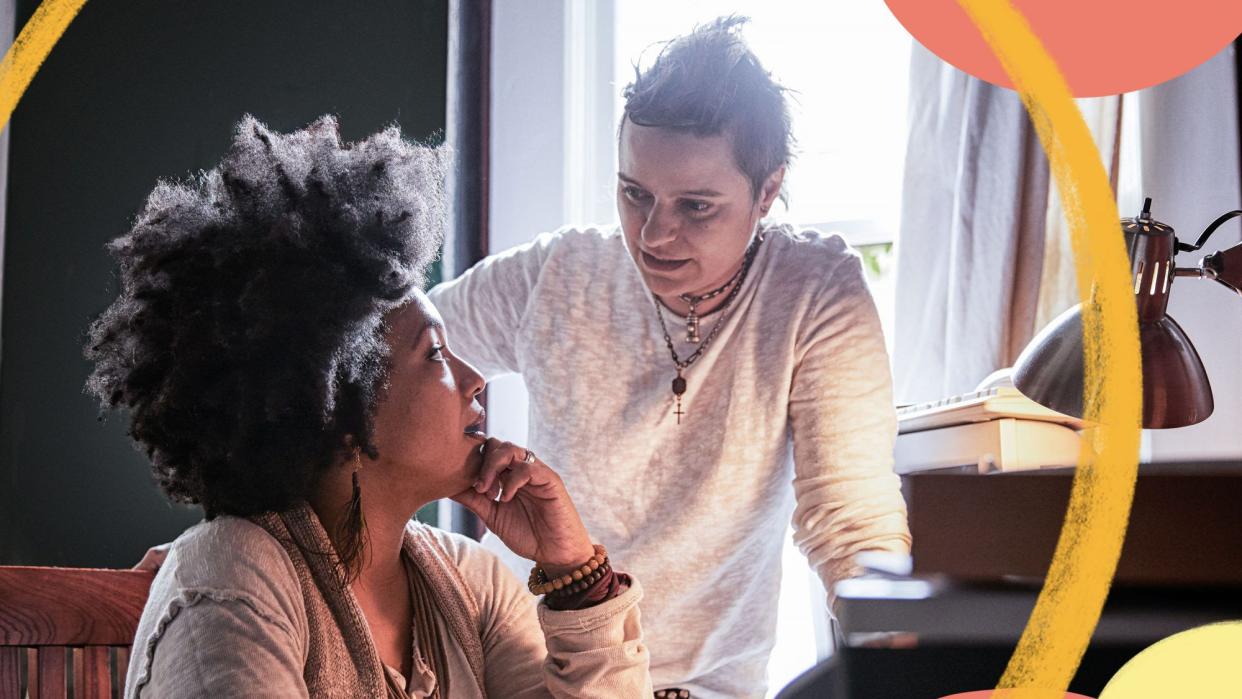Your Love Language Is Fine, But You Need to Learn the Right Apology Language

- Oops!Something went wrong.Please try again later.
Getty Images
DEAR DR. JENN,
Whenever I screw up with my girlfriend and try to say sorry, it feels like she just isn't willing to accept my apology. I can't figure out what I am doing wrong and how to express that I genuinely am sorry. I feel like I'm not using the exact words she wants to hear, and it prevents us from moving on from the fight. Are there some rules to doing this right? —Actually Sorry
DEAR SORRY,
Knowing how to make an effective apology is a very important life skill. It sounds like yours are not landing with your girlfriend and your technique could use some improvement.
Too often, people just say the words 'I'm sorry' which can feel very superficial to the recipient. It's possible that your girlfriend might feel you need to take more responsibility and fully explain what you are apologizing for — instead of just trying to make the conflict go away.
This is where the topic of 'apology languages' comes into play. Gary Chapman (most known for his book The Five Love Languages) and Jennifer Thomas wrote a book called The Five Languages of Apology. While the five love languages (receiving gifts, quality time, words of affirmation, acts of service, and physical touch) help you to show or tells your partner that you love them, your 'apology language' helps you tell or show a person you're truly sorry.
According to Chapman and Thomas, there are five apology languages in total, although it's possible to have multiple, depending on the situation.
1. Expressing regret ("I apologize"). While saying you are sorry is a good first step, it is only that. It is necessary to start the making of amends but must go deeper than that otherwise you run the risk of it seeming like you are apologizing to make the problem go away. The apology must be heartfelt and show genuine remorse.
2. Accepting responsibility ("I was wrong"). Owning your mistake is very important. As soon as you start pointing the finger at the other person or blaming others, your apology is going to fail. If you are unable to recognize your contribution to the problem and admit your part in it, the other person is going to feel like it will happen again. Admitting how you screwed up and that something was your fault allows the other person to feel more secure that you understand what you did wrong and, therefore, are less likely to do it again.
3. Making restitution ("What can I do to make it right?"). When my daughters were very little most of their friends' parents forced their kids to say 'I am sorry' if they did something that upset another child. But I always asked my kids to offer, 'What can I do to help you now?' Making things right and offering a solution is healing.
4. Genuinely repenting ("I'll try not to do that again"). Repenting is a commitment to change. It requires an open dialogue to problem-solve together on a deeper level. Your partner may suggest that you get therapy or ask for transparency on social media. Making a commitment not you hurt your loved one again requires more than just words, there needs to be a plan, ideally in writing.
5. Requesting forgiveness ("Will you please forgive me?"). This is important because it shows the other person that you care to have the relationship healed and restored. It is a big ask because not everyone can forgive. It also humbles you to that other person and shows a level of vulnerability that is helpful in facilitating healing. You cannot demand forgiveness, you must ask for it.
RELATED: This Emotionally Abusive Habit Is a Guaranteed Relationship Killer
Why it's so important to know your partner's love language:
Perhaps you're wondering.... aren't all of these 'apology languages' kind of important for a solid apology? How do I choose just one? Well, in my clinical experience, a full heartfelt apology does require all five, which is why I recommend using them as steps. They're all pretty solid components of the ideal apology — even outside of romantic relationships. (Maybe you'll find them helpful for moving past conflict with your mom, for example.)
That said, it can still be helpful to know your partner's specific language of apology so you can hit the nail on the head with an apology they will respond best to. Because while you might be fine with just hearing, "I'm sorry, I screwed up," your partner may want to hear your plan for preventing it from happening again, or how you'll make things right. Or perhaps they may want you to explicitly ask for forgiveness — even if that's not something you would ever think to do. Taking Chapman and Thomas's quiz with your partner to learn more about each of your apology languages can help prevent this apology miscommunication.
Then, the next time you get into a riff, you can know exactly how to say sorry the "right" way — and actually move past your fight, for real.
In Hump Day, award-winning psychotherapist and TV host Dr. Jenn Mann answers your sex and relationship questions — unjudged and unfiltered.

